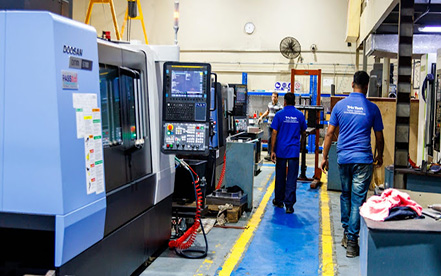Product Category

CNC Machine Shop
Features:
- High productivity
- Good Processing Control
- Quality accuracy and machining time error accuracy
- Custom Manufacturing Solutions
- Experienced Engineering Team
Trio Tech is a premier CNC machine shop dedicated to delivering high-quality manufacturing solutions for a wide range of industries. We offer all types of CNC processes, producing a variety of machined parts across sectors such as Oil & Gas, Aerospace, Marine, and Automotive.
At Trio Tech, quality is our top priority. We implement rigorous quality control measures throughout the manufacturing process, ensuring that every component meets our high standards. Our dedicated quality assurance team conducts thorough inspections and tests, guaranteeing that the finished products are precise, reliable, and ready for use in demanding applications.
With years of experience in the CNC machining industry, Trio Tech has built a reputation for quality, reliability, and exceptional customer service. Get in touch with us today to explore how we can turn your project ideas into reality!
Applications:
- Prototype Development: Creating prototypes for testing in consumer goods, automotive, and electronics.
- Custom Tooling: Manufacturing specialized tools and fixtures to optimize industrial processes.
- Medical Equipment: Creating precise implants and surgical instruments with a focus on cleanliness.
- Aerospace Components: Fabricating specialized parts that meet strict aerospace regulations.
- Mold Manufacturing: CNC machining is the ideal method for producing molds due to its ability to deliver high precision, repeatability, and efficiency for mass production.